Earthquake in Türkiye and Syria
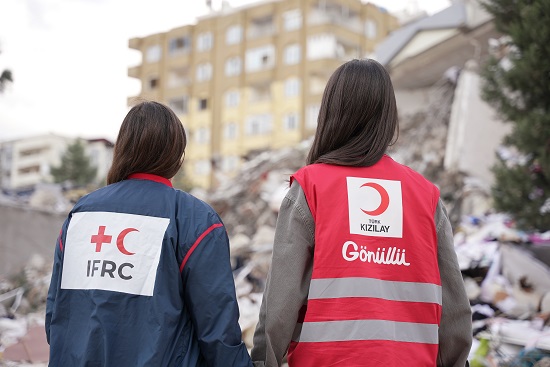
A devastating, 7.8-magnitude earthquake struck Türkiye in the early hours of February 6, 2023, which was quickly followed by a second earthquake and thousands of aftershocks. The earthquakes hit near Gaziantep, Türkiye, impacting 11 provinces in the south and southeast of the country, as well as highly vulnerable areas in northern Syria.
Six months later, people in both countries continue to require urgent support with permanent shelter, healthcare, access to clean water, sanitation, food, as well as access to mental health and psychosocial support services. Millions of people in Türkiye are still living in tents. Many people lost not only their homes but their source of income – many shops, offices and agricultural business were damaged and destroyed. The aftermath of the earthquake has created immense needs for mental health and psychosocial support.
Rebuilding and recovery will take years. Continued solidarity with the people of Syria and Türkiye is needed as they navigate the path towards full recovery.
In Syria, the earthquake has exacerbated the dire humanitarian situation
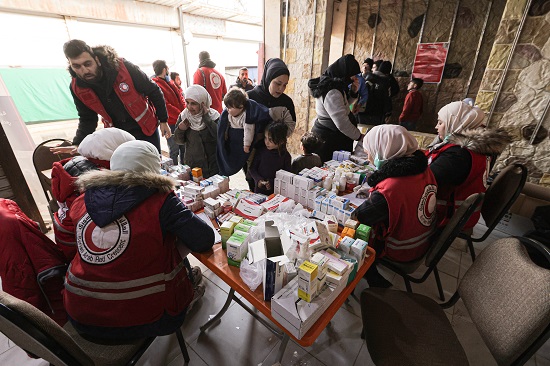
The earthquake hit at a time when humanitarian needs in Syria are at their highest since the conflict began. With more than 90 per cent of people living in poverty and about 6.7 million people internally displaced, economic deterioration compounded with the impact of the earthquake. Water facilities have been heavily impacted by the earthquake, leaving families to rely on unsafe water or unsustainable water trucking.
Find out more about how the Canadian Red Cross is supporting Syria Crisis
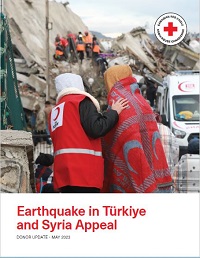
Donor Update – May 2023
How the Red Cross & Red Crescent Movement is helping people affected by the earthquakes
Canadian Red CrossThe Canadian Red Cross Earthquake in Türkiye and Syria Appeal continues to allow the Red Cross and Red Crescent Movement to deliver emergency relief to those impacted by the earthquakes. Our support has included:
- Contributing funds to support Red Cross Red Crescent humanitarian relief efforts in Türkiye and Syria, including $10 million in matching funds generously provided by the Government of Canada.
- Sending humanitarian experts to Syria and Türkiye. These deployments were supported by the Government of Canada and generous donations from people in Canada.
- Supporting the Finnish Red Cross with operating mobile health units in Latakia, Syria and surrounding areas, with support from the Government of Canada. The mobile health units offer basic healthcare services, including psychosocial support, to areas impacted by the earthquake and over a decade of conflict.
- Sending 22,000 relief items to help the Red Cross Red Crescent Movement’s humanitarian response efforts in Türkiye, from both the Government of Canada stockpiles and our own stocks. This includes blankets, hygiene kits, kitchen sets, tarpaulins, and jerry cans.
Turkish Red Crescent
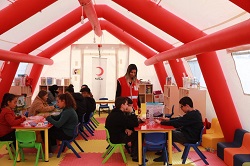
Turkish Red Crescent personnel have been providing food service – including hot meals and clean water – and health care in rural areas and in temporary shelters through mobile clinics, including a dental clinic. They are also distributing multi-purpose cash assistance and vouchers to those who have been affected. Cash assistance programs help survivors meet their basic needs, while also boosting the local economy in the affected areas. In the coming months, the key priority will be supporting agriculture and small businesses affected by the earthquake, to help revive the market. Turkish Red Crescent teams are also supporting mental health and psychosocial support spaces for people affected, those in temporary shelters, first responders and healthcare workers, as well as child-friendly spaces.
Syrian Arab Red Crescent
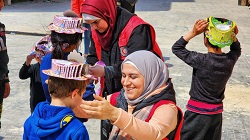
Syrian Arab Red Crescent continues to be the main humanitarian actor in Syria, providing essential support to communities affected by the earthquake and the ongoing conflict, including food, water, shelter, and basic relief items. With limited resources, teams are also supporting a wide range of health care services in clinics and mobile units, including community health, maternal and newborn health, physical rehabilitation, and psychosocial support to help people deal with the mental health impacts of the earthquakes and decades-of conflict.
